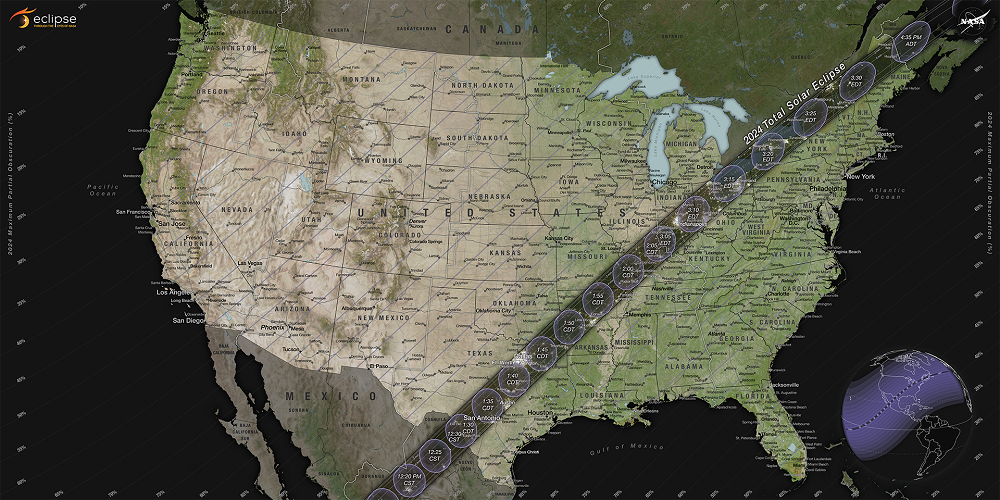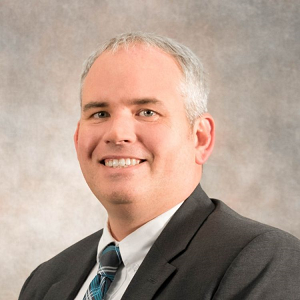A select group of credit unions across the country are set to close their doors early on Monday, April 8. But this is no holiday.
Rather, it’s the first total solar eclipse in nearly seven years — a phenomenon that won’t occur again in the United States for another 20 years.
What makes this eclipse — and its predecessor in 2017 — so important is its “path of totality,” which includes a broad swath of the nation. Although the eclipse will be visible from nearly everywhere, those areas within the path of totality will experience total darkness for just a few minutes in the middle of the day.

Click to view larger size.
This year, the path of totality spans from Texas to Maine and is expected to be a major economic event as well as an astrological one. One report indicates related expenditures could, ahem, eclipse $1.6 billion.
More than 31 million people live within the path of totality, and the eclipse is expected to draw as many as 4 million tourists. That’s leading many credit unions and other businesses in those regions to adjust operations for the day.
Fremont Federal Credit Union ($334.1M, Fremont, OH), will close branches at 1:00 P.M. local time. The credit union is headquartered slightly more than an hour west of Cleveland on the shores of Lake Erie, and its CEO, Nicholas Cray, says local leaders expect to see double or triple the number of people in the area as normal.

“There are some concerns about normal traffic volume and the ability of infrastructure like gas stations and emergency services to be able to handle that volume of people,” Cray says.
The credit union is asking employees who can work remotely — particularly staffers in back-office roles — to do so.
“We want to clear folks out of the buildings as best we can so we can give them a chance to get home and enjoy the eclipse with their families,” the CEO says.
That’s expected to make things easier after the eclipse ends, when traffic picks up as visitors leave town. However, eclipse tourists are expected to trickle into the area a few days early, and Fremont is taking steps to be prepared. The credit union is making additional cash available at branches and stocking up ATMs at higher-traffic locations. Cray also is expecting an uptick in e-service usage for services that many members often still visit the branch for, including check deposits and transfers.
To help build excitement, Fremont is giving away a variety of themed items, including eclipse-viewing glasses and even Eclipse-brand gum.
Because of the credit union’s downtown location, there’s a possibility the Fremont FCU parking lot could see out-of-towners setting up lawn chairs in advance of the eclipse — not the sort of traffic management Cray had in mind when he took over as CEO three years ago.
“You can kind of tell the difference between somebody stopping in to do a transaction versus setting up their lawn chairs to be there for the day,” Cray says. “So long as we’re able to remain open and conduct business, it’s not that big a concern for us. If it starts to become too congested, that’s a different story, and we’ve talked through the response plans.”
Those options range from politely asking eclipse tourists to find a different spot to turning to more official resources.
“We’re also telling our managers there’s no reason to get into confrontations with folks,” the CEO adds.
Work-Life Balance
Further south, Austin Federal Credit Union ($37.9M, Austin, TX) will close at noon so staff can watch the eclipse from home. The city is generally always bustling, and the influx of people traveling to be within the path of totality is likely to make things even more hectic. Plus, says CEO Mindy Bayer, four of her 10 staff members requested the day off.

Austin FCU is the eastern-most CO-OP Shared Branching location in the metro area, and Bayer anticipates some extra foot traffic on the Friday before the event and in the morning hours before it gets dark. Thankfully, she says, credit union staff have plenty of experience managing an influx of tourists visiting town for events like South By Southwest and the Austin City Limits music festival, so the eclipse should be a breeze.
“With shared branching especially, our branch operations fluctuate pretty widely, so I don’t think we’re going to be in a position where we’re going to run out of money,” she says. “Really, the main thing was just communicating [the early closure] to our members well enough in advance so they could plan to do whatever they needed to do [in branch] that morning.”
Bayer says her board fully supports the decision to close early, and the move is in line with others she has made to ease work-life balance, such as closing for all of Christmas Eve day rather than working a half-day.
“I tend to lean toward, ‘What is the thing that’s going to make my employees feel valued?’” Bayer says. “Being here at the credit union is not the only thing they care about.”
SIU Does It Again
Bayer says she believes hers is the only Austin-area credit union to close for the eclipse, based on responses to a local credit union CEO email group, many of whom downplayed the need to close, she says.
They’re not alone.
SIU Credit Union ($477.2M, Carbondale, IL), probably knows better than anyone what to expect from the eclipse. Located near St. Louis, MO, that region holds the distinction of being the only part of the country to be in the path of totality in both 2017 and 2024.
That’s given CEO Mike Lantrip a unique vantage point for this year’s event.
SIU closed for about an hour in 2017 to give staff the chance to see the eclipse — full darkness only lasts approximately four minutes — and then return to a normal workday. Lantrip is doing things similarly this time around, although some staffers are taking the day off.

“I think our folks know you’re probably going to need to bring your lunch that day,” Lantrip says. “It’s probably going to be harder to get into some of the restaurants.”
Having learned from the last time, SIU did not order extra cash this time around. In 2017, the credit union wound up with so much extra money on hand that it had to return it to the Federal Reserve.
“We were predicting all these people were going to come in and use our ATMs,” he says. “We have debit cards; everybody uses those.”
Lantrip and his team ordered approximately 1,000 pairs of eclipse glasses and are giving two sets to each staff member. Whatever is left will be available for members to purchase for $2. The glasses cost the credit union about $1.50 each, and any money the sales bring in will go toward SIU’s jeans day fund for charity.
This time around, Lantrip’s hoping he gets to see the moon pass in front of the sun. He missed it in 2017 because of cloud cover.
“We didn’t see it,” he says. “My parents are five miles away, and they said it was spectacular. My wife came to watch it with me and she didn’t get to see it. This year she’s going to be in the car and be mobile. If a cloud shows up, she can drive.”
If that’s the case, there’s always 2045.